The Good Shepherd
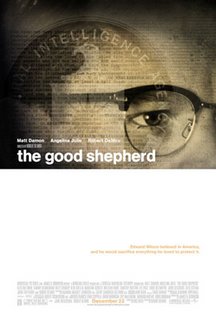 Has being stuck with the relatives over the Holidays driven you to the point of insanity, and you desperately need some time away from them? For this, I can recommend The Good Shepherd. Clocking in at nearly three hours, the film should provide a long-enough of an escape for anyone seeking some quiet time alone. Unfortunately, those of you who may be looking for entertainment to go along with this may be disappointed. Actor Robert De Niro makes his first credited directing effort in 13 years since 1993's A Bronx Tale with this frigid and tepid drama that strangely never comes to life, despite a top flight cast and a premise that should provide plenty of suspense and thrills but never does. The Good Shepherd is not a complete waste of time, but considering the talent involved on and off the screen, it never seems to live up to the promise it holds.
Has being stuck with the relatives over the Holidays driven you to the point of insanity, and you desperately need some time away from them? For this, I can recommend The Good Shepherd. Clocking in at nearly three hours, the film should provide a long-enough of an escape for anyone seeking some quiet time alone. Unfortunately, those of you who may be looking for entertainment to go along with this may be disappointed. Actor Robert De Niro makes his first credited directing effort in 13 years since 1993's A Bronx Tale with this frigid and tepid drama that strangely never comes to life, despite a top flight cast and a premise that should provide plenty of suspense and thrills but never does. The Good Shepherd is not a complete waste of time, but considering the talent involved on and off the screen, it never seems to live up to the promise it holds.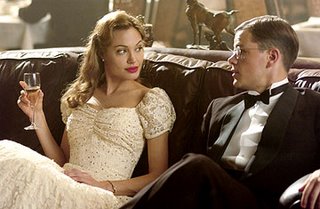 The film follows the early days of the C.I.A. as seen through the eyes of fictional Agent Edward Wilson (Matt Damon). From his early college days in the late 1930s as a member of the secret Skull and Bones society at Yale, Edward finds himself connected to some very important and powerful people in the government, who start asking for his help. He begins by helping to spy on some professors on campus who may be secret Nazi supporters, and soon starts to get involved with overseas affairs. He is eventually approached by a man named Bill Sullivan (Robert De Niro) to join a new organization that will eventually grow into the C.I.A. As Edward soon discovers, a life of secrecy and shadows is bound to lead to distrust of those around you. It also puts a terrible strain on his relationship with his estranged wife Clover (Angelina Jolie), who feels like she's never truly gotten to know the man she married, and son Edward, Jr. (Eddie Redmayne), who also eventually joins the C.I.A. in order to be closer to his father.
The film follows the early days of the C.I.A. as seen through the eyes of fictional Agent Edward Wilson (Matt Damon). From his early college days in the late 1930s as a member of the secret Skull and Bones society at Yale, Edward finds himself connected to some very important and powerful people in the government, who start asking for his help. He begins by helping to spy on some professors on campus who may be secret Nazi supporters, and soon starts to get involved with overseas affairs. He is eventually approached by a man named Bill Sullivan (Robert De Niro) to join a new organization that will eventually grow into the C.I.A. As Edward soon discovers, a life of secrecy and shadows is bound to lead to distrust of those around you. It also puts a terrible strain on his relationship with his estranged wife Clover (Angelina Jolie), who feels like she's never truly gotten to know the man she married, and son Edward, Jr. (Eddie Redmayne), who also eventually joins the C.I.A. in order to be closer to his father. The Good Shepherd is a cold and isolated movie that constantly keeps us at a complete and total distance from everyone who walks onto the screen. Motivations and actions are murky at best, relationships are sketchy and sometimes even non-existent, and everybody walks around so melancholy and depressed at all times you almost start to wonder if the early C.I.A. Agents were actually robots unable to display anything related to emotion. The way that the screenplay by Eric Roth (Munich) tells the story is so dry and basic, there's really no excuse for the movie to run at the obscene length that it does. And yet, it keeps on going, moving at the pace of a turtle with lead weights tied to its legs. The length would not be a problem if the characters were interesting or the plot was engaging. Unfortunately, here, the movie almost seems to be on some kind of bizarre quest to make the characters as stiff and uninteresting as humanly possible. Nobody is allowed to show even the slightest hint of personality. It's impossible to get behind Edward Wilson as a protagonist, since the film refuses to let us know anything about him, nor does he ever get to show any sign of life. At first, Matt Damon's performance seems quiet and tortured. But, as the movie goes on, and he keeps that same stone-faced expression no matter what's happening in the story, we begin to realize that Damon just got stuck with a lousy role and he doesn't know what to do with the character. I also found it somewhat hard to swallow that although the film's story spans a little over 20 years or so, his character never seems to truly age. I had a hard time distinguishing the college age Edward Wilson at the beginning from the nearing middle age Edward we see during the later half.
The Good Shepherd is a cold and isolated movie that constantly keeps us at a complete and total distance from everyone who walks onto the screen. Motivations and actions are murky at best, relationships are sketchy and sometimes even non-existent, and everybody walks around so melancholy and depressed at all times you almost start to wonder if the early C.I.A. Agents were actually robots unable to display anything related to emotion. The way that the screenplay by Eric Roth (Munich) tells the story is so dry and basic, there's really no excuse for the movie to run at the obscene length that it does. And yet, it keeps on going, moving at the pace of a turtle with lead weights tied to its legs. The length would not be a problem if the characters were interesting or the plot was engaging. Unfortunately, here, the movie almost seems to be on some kind of bizarre quest to make the characters as stiff and uninteresting as humanly possible. Nobody is allowed to show even the slightest hint of personality. It's impossible to get behind Edward Wilson as a protagonist, since the film refuses to let us know anything about him, nor does he ever get to show any sign of life. At first, Matt Damon's performance seems quiet and tortured. But, as the movie goes on, and he keeps that same stone-faced expression no matter what's happening in the story, we begin to realize that Damon just got stuck with a lousy role and he doesn't know what to do with the character. I also found it somewhat hard to swallow that although the film's story spans a little over 20 years or so, his character never seems to truly age. I had a hard time distinguishing the college age Edward Wilson at the beginning from the nearing middle age Edward we see during the later half.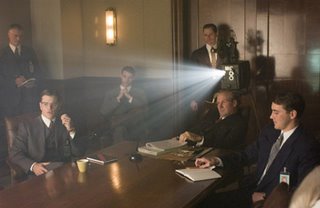 That's one of the main problems I had with this movie. As The Good Shepherd jumps back and forth through different time periods to tell it's story, we never truly get a real passage of time, as Edward's son seems to be the only person capable of aging in a span of 20 years. Were it not for the numerous captions at the bottom of the screen, always there to tell us when we've jumped to a different time period or place, or the fact that the characters are talking about a different world situation (World War II, Russia, Bay of Pigs), the audience wouldn't be able to tell how much time is supposed to have passed. Aside from the change in world events, the dialogue remains wooden and stilted throughout. The characters talk in such a scripted and planned manner, they come across as if they know they're in a spy movie, and have studied how characters in these kind of movies are supposed to talk and act. Instead of watching a fact-based drama, we're watching an overly calculated genre film that knows what it's supposed to do, but can't figure out how to do so without drawing attention to itself that it is trying too hard. The film's not a complete lost cause, as it does work in bits and pieces. There is an especially brutal interrogation scene where a Russian spy is being questioned that features the intensity and tension that is missing from the rest of the film. There is also a moment late in the film concerning a woman on an airplane that is powerful, terrifying and tragic at the same time. It's during these brief moments that De Niro shows us the movie this could have been. He's actually very good behind the camera, and a lot of the scenes look great. They are just brought down by the fact that very little of interest ever happens within them.
That's one of the main problems I had with this movie. As The Good Shepherd jumps back and forth through different time periods to tell it's story, we never truly get a real passage of time, as Edward's son seems to be the only person capable of aging in a span of 20 years. Were it not for the numerous captions at the bottom of the screen, always there to tell us when we've jumped to a different time period or place, or the fact that the characters are talking about a different world situation (World War II, Russia, Bay of Pigs), the audience wouldn't be able to tell how much time is supposed to have passed. Aside from the change in world events, the dialogue remains wooden and stilted throughout. The characters talk in such a scripted and planned manner, they come across as if they know they're in a spy movie, and have studied how characters in these kind of movies are supposed to talk and act. Instead of watching a fact-based drama, we're watching an overly calculated genre film that knows what it's supposed to do, but can't figure out how to do so without drawing attention to itself that it is trying too hard. The film's not a complete lost cause, as it does work in bits and pieces. There is an especially brutal interrogation scene where a Russian spy is being questioned that features the intensity and tension that is missing from the rest of the film. There is also a moment late in the film concerning a woman on an airplane that is powerful, terrifying and tragic at the same time. It's during these brief moments that De Niro shows us the movie this could have been. He's actually very good behind the camera, and a lot of the scenes look great. They are just brought down by the fact that very little of interest ever happens within them.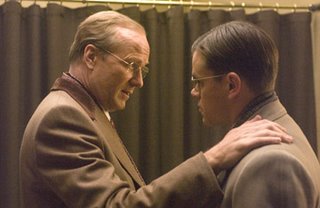 Despite Matt Damon's phoned in lead role, there are a couple stand out supporting performances on display here, though nothing too strong. Angelina Jolie gets a couple scenes that would come across as powerful if the movie had spent a little bit more time developing her character, but she at least tries her best, and is one of the few actors in the movie who gets to display emotion. John Turturro also gets a couple choice moments as one of the other Agents, particularly during the previously mentioned interrogation scene. Other performances of note include Michael Gambon as Edward's professor in college, and Tammy Blanchard who is sweet and likeable as Edward's first love that he is forced to leave behind after Clover becomes pregnant, and he is forced to marry her. The rest of the big names featured in the cast, however, are mainly stuck in forgettable cameos that barely register. Robert De Niro, William Hurt and Joe Pesci (who has not acted on the big screen since 1998's Lethal Weapon 4) are given such limited screen time that you almost forget they're in the movie. Besides the performances, the only other feature of note is the attractive cinematography by Robert Richardson (The Aviator) that gives many of the film's scenes a handsome polish and creates the proper mood for each sequence.
Despite Matt Damon's phoned in lead role, there are a couple stand out supporting performances on display here, though nothing too strong. Angelina Jolie gets a couple scenes that would come across as powerful if the movie had spent a little bit more time developing her character, but she at least tries her best, and is one of the few actors in the movie who gets to display emotion. John Turturro also gets a couple choice moments as one of the other Agents, particularly during the previously mentioned interrogation scene. Other performances of note include Michael Gambon as Edward's professor in college, and Tammy Blanchard who is sweet and likeable as Edward's first love that he is forced to leave behind after Clover becomes pregnant, and he is forced to marry her. The rest of the big names featured in the cast, however, are mainly stuck in forgettable cameos that barely register. Robert De Niro, William Hurt and Joe Pesci (who has not acted on the big screen since 1998's Lethal Weapon 4) are given such limited screen time that you almost forget they're in the movie. Besides the performances, the only other feature of note is the attractive cinematography by Robert Richardson (The Aviator) that gives many of the film's scenes a handsome polish and creates the proper mood for each sequence.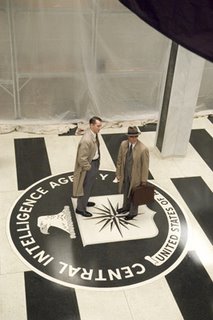
The Good Shepherd is not the worst failed Oscar bait movie to come along, but considering how long this project's been in the planning stages (De Niro's apparently been wanting to make this movie for the past 10 years), I really was expecting more. Here is a movie that promises intrigue and suspense, and aside from a couple choice moments, just never finds the right tone. The film is lifeless and lethargic, when it should be tense and quick. Despite the film's ad campaign promising us an inside look at how the C.I.A. came to be, we feel just as informed at the end as we were at the beginning, which is to say not very. I wanted to be engaged and informed, and in the end, The Good Shepherd came up short on both counts.
See the movie times in your area or buy the DVD at Amazon.com!






0 Comments:
Post a Comment
<< Home